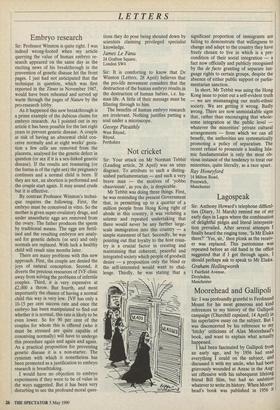LETTERS Embryo research
Sir: Professor Winston is quite right. I was indeed wrong-footed when my article querying the value of human embryo re- search appeared on the same day as the exciting news of his breakthrough in the prevention of genetic disease hit the front pages. I just had not anticipated that the technique in question, which was first reported in the Times in November 1987, would have been reheated and served up warm through the pages of Nature by the pro-research lobby.
As it happened this new breakthrough is a prime example of the dubious claims for embryo research. As I pointed out in my article it has been possible for the last eight years to prevent genetic disease. A couple at risk of having an abnormal child con- ceive normally and at eight weeks' gesta- tion a few cells are removed from the placenta, analysed for the genetic defect in question (or sex if it is a sex-linked genetic disease). If the results are reassuring (or the foetus is of the right sex) the pregnancy continues and a normal child is born. If they are not, an abortion is performed and the couple start again. It may sound crude but it is effective.
By contrast Professor Winston's techni- que requires the following. First, the embryo must be conceived in vitro. So the mother is given super-ovulatory drugs, and under anaesthetic eggs are removed from the ovary. The father produces the sperm by traditional means. The eggs are fertil- ised and the resulting embryos are analy- sed for genetic defects (or sex) and only normals are replaced. With luck a healthy child will result nine months later.
There are many problems with this new approach. First, the couple are denied the joys of natural conception. Second, it diverts the precious resources of IVF clinic away from solving the problems of infertile couples. Third, it is very expensive at £2,000 a throw. But fourth, and most importantly the chance of having a normal child this way is very low. IVF has only a 10-15 per cent success rate and once the embryo has been manipulated to find out whether it is normal, this rate is likely to be even lower. So for 90 per cent of the couples for whom this is offered (who it must be stressed are quite capable of conceiving normally) will have to undergo this procedure again and again and again. As a practical proposition for preventing genetic disease it is a non-starter. The cynicism with which it nonetheless has been promoted as a justification to embryo research is breathtaking.
I would have no objection to embryo experiments if they were to be of value in the ways suggested. But it has been very disturbing to see the profound moral ques- tions they do pose being shouted down by scientists claiming privileged specialist knowledge.
James Le Fanu
24 Grafton Square, London SW4


















































 Previous page
Previous page